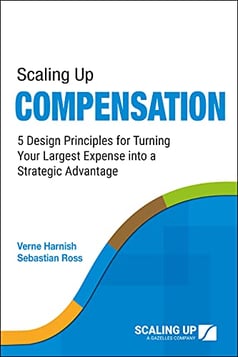 Scaling Up Compensation by Verne Harnish, and Sebastian Ross offers great examples of companies that have turned one of the most challenging and thorny issues a business can face into a strategic advantage.
Scaling Up Compensation by Verne Harnish, and Sebastian Ross offers great examples of companies that have turned one of the most challenging and thorny issues a business can face into a strategic advantage.
Several key thoughts emerge including:
- People Are Not a Cost; They Are an investment: the investments in people foster behaviors that customers appreciate, differentiate your firm, and put in motion a virtuous cycle where everybody wins: employees, customers, and shareholders.
- Your system will only be effective if it is tailored to your unique context. Make compensation a critical part of your strategy, make it your own, and make it different.
- The key is to design a transparent and equitable system that allows for meaningful differences in pay between low, average, and top performers. Performance is not normally distributed, and thus pay shouldn’t be either.
- Most bonus plans fail to drive performance – instead, they become entitlements and provoke undesired behaviors. We argue that individual financial incentives only work for simple, routine, measurable, and independent jobs and that your sales roles are likely the only candidates where such carrots will be effective.
The stories in the book are the highlight. Each story shares how a company’s compensation package develops and instills its culture, attracts, or repels employees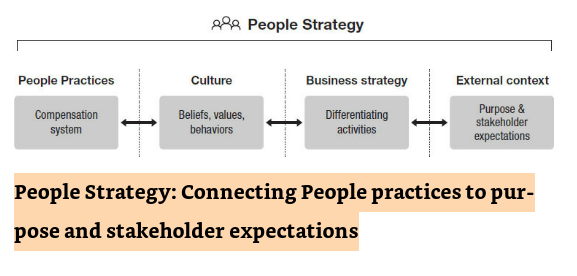 Here are the 5 Design Principles:
Here are the 5 Design Principles:
- Be Different: Aligning Compensation with Culture and Strategy
The key to any effective strategy is being different. Design a “strange” compensation plan to incentivizes behaviors your customers and other stakeholders expect. Make sure your comp plan aligns with your culture/core values or risk it being rejected. That’s why it is dangerous to just copy someone else’s compensation plan. Don’t look at people as a cost; they are an investment. This mindset is crucial as you design a compensation plan that supports what Verne and Sebastian call a Good Jobs Strategy. This allows you to scale with fewer people, who are paid more, yet with a lower total cost basis than your competition – a win, win, win in the marketplace.
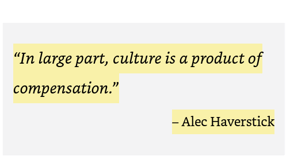 Fairness Not Sameness: Creating a Coherent and Flexible Pay Structure
Fairness Not Sameness: Creating a Coherent and Flexible Pay Structure
Get the mix of fixed and variable compensation right keys to an effective compensation plan. Be clear about what you reward with each. Base compensation is rarely motivational – and raises are short-lived in their impact – Verne & Sebastian feel this component of compensation is considered a hygiene factor.
- Easy on the Carrots: Using Individual Incentives Effectively
Financial incentives influence employee behaviors in three ways. They help people decide if they want to work at your firm (selection effect), tell employees what is important (information effect), and motivate people to try harder (motivation effect). Be careful what you reward! Sebastian and Verne caution to go easy on carrots. Monetary rewards are effective under 8 conditions, yet they rarely apply. Sales is likely the only area where incentives work well.
- Gamify Gains: Driving Critical Numbers Through P(l)ay
To achieve FAST (vs. SMART) goals shorter-term gain-sharing plans gamify the business and add a level of fun and excitement (and dopamine addiction!) See Mini-Games. This drives clearer focus and better decision-making throughout the organization. Borrow from the psychology employed by casinos, intermittent and surprise rewards are one type of compensation that is highly motivational, driving magnitude increases in results. It’s important to remember, people are not logical; they are psychological. Design comp accordingly.
- Sharing Is Caring: Getting Employees to Think Like Owners
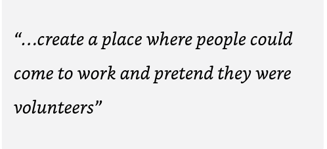 Profit-sharing is a question of fairness, with the added benefit of creating an ownership mentality throughout the organization. Like other forms of compensation, it is not necessarily a motivator, but it does influence the team’s decisions positively – as long as it doesn’t support “bad profits.” Profit-sharing helps mid-market firms to compete for talent. Longer-term value sharing (stock and stock options) aligns with the interests of owners and employees. It can create true wealth for your team and even eliminate a key constraint in your industry, as it did for Outback Steakhouse.
Profit-sharing is a question of fairness, with the added benefit of creating an ownership mentality throughout the organization. Like other forms of compensation, it is not necessarily a motivator, but it does influence the team’s decisions positively – as long as it doesn’t support “bad profits.” Profit-sharing helps mid-market firms to compete for talent. Longer-term value sharing (stock and stock options) aligns with the interests of owners and employees. It can create true wealth for your team and even eliminate a key constraint in your industry, as it did for Outback Steakhouse.
A reminder from Propeller: Accelerating Change by Getting Accountability Right blogs:
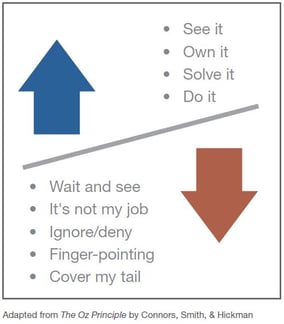 A company’s culture is the sum of the experiences, beliefs, and actions that enable it to achieve its Key Results or impede it from doing so.
A company’s culture is the sum of the experiences, beliefs, and actions that enable it to achieve its Key Results or impede it from doing so.
The right culture practically guarantees success; the wrong culture will almost always lead to failure.
Either you manage your culture, or it will manage you.
Compensation is another way to manage your culture.
To create an environment where everyone is inspired to give their best, contact Positioning Systems today to schedule a free exploratory meeting.
Growth demands Strategic Discipline.
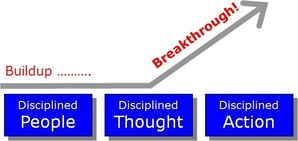 Building an enduring great organization requires disciplined people, disciplined thought, disciplined action, superior results, producing a distinctive impact in the world.
Building an enduring great organization requires disciplined people, disciplined thought, disciplined action, superior results, producing a distinctive impact in the world.
Discipline sustains momentum, over a long period of time, laying the foundations for lasting endurance.
A winning habit starts with 3 Strategic Disciplines: Priority, Metrics, and Meeting Rhythms. -1.jpg?width=311&name=3%20Disciplines%20of%20Execution%20(Strategic%20Discipline)-1.jpg) Forecasting, accountability, individual, and team performance improve dramatically.
Forecasting, accountability, individual, and team performance improve dramatically.
Meeting Rhythms achieve a disciplined focus on performance metrics to drive growth.
Let Positioning Systems help your business achieve these outcomes on the Four most Important Decisions your business faces:
|
DECISION |
RESULT/OUTCOME |
|
PEOPLE |
|
|
STRATEGY |
|
|
EXECUTION |
|
|
CASH |
|
Positioning Systems helps mid-sized ($5M - $250M) business Scale-UP. We align your business to focus on Your One Thing! Contact dwick@positioningsystems.com to Scale Up your business! Take our Four Decisions Needs Assessment to discover how your business measures against other Scaled Up companies. We’ll contact you.
NEXT BLOG – Good Jobs Strategy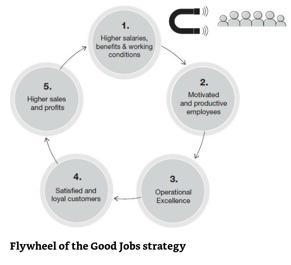
“Worry about what people do, not what they cost,” writes Jeffrey Pfeffer in his classic HBR article Six Dangerous Myths about Pay. Next blog will share a specific story about, a Spanish Supermarket Chain, from Scaling Up Compensation, focusing on the Good Jobs Strategy, its flywheel, and why your focus should not be about what your people cost, but what they do.






.jpeg?width=150&height=135&name=Hand%20with%20marker%20writing%20the%20question%20Whats%20Next_%20(1).jpeg)

